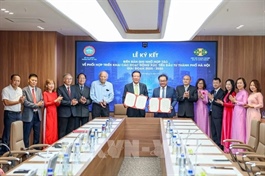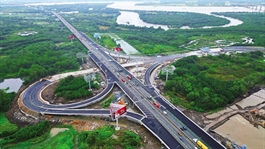Vietnamese businesses face challenges with succession planning
Vietnamese businesses face challenges with succession planning
Global talent solutions provider Robert Walters Vietnam has released a report on the state of planning succession in Vietnam.
|
The study, “Success in succession: Building a leadership pipeline to keep your business thriving”, found that 87 per cent of businesses face challenges, with 44 per cent lacking a plan and over one in five rating their strategies as ineffective. More than half also cited unclear policies and procedures, underscoring the need for structured approaches. At the same time, the report highlights the benefits of effective succession, planning from ensuring leadership continuity and reducing disruptions to improving retention and helping organisations adapt to future challenges.
Vietnam's workforcedynamics are adding complexity to these challenges. The country is facing the dual pressures of an aging workforce and the reluctance of younger generations to step into leadership roles. According to the survey, 37 per cent of organisations reported difficulties in transferring knowledge and expertise to younger employees, while 22 per cent said younger generations are not interested in pursuing leadership positions.
A further 16 per cent highlighted challenges in finding suitable replacements for retiring employees, and 18 per cent expressed concerns about losing critical skills and experience. This demographic shift is making it increasingly difficult for Vietnamese businesses to ensure smooth leadership transitions and secure long-term organisational resilience.
"In Vietnam's fast-changing business environment, succession planning is more than a strategic move – it's a necessity. With limited resources for development and few clear advancement pathways, companies must take proactive steps to identify high-potential talent and nurture them through structured development plans. This not only strengthens leadership pipelines but also ensures long-term organisational resilience," said Phuc Pham, country manager of Robert Walters Vietnam.
In addition to demographic pressures, the report highlights cultural and organisational factors that shape how companies in Vietnam approach succession planning. Findings show that 67 per cent of organisations emphasise maintaining harmony, 45 per cent respect hierarchy and seniority, and 20 per cent note family influence in business decisions.
On the organisational side, 59 per cent of respondents cited a scarcity of qualified talent, 55 per cent pointed to rigid structures, and 35 per cent said factors such as organisational size and industry type complicating the process. Other barriers include insufficient resources for training and leadership development (53 per cent) and lack of leadership buy-in, both making it harder to sustain effective strategies. Together, these realities create substantial obstacles to building strong leadership pipelines and make succession planning in Vietnam particularly complex.
The shortage of qualified leaders, combined with structural constraints, leaves many organisations unprepared for leadership changes. Larger businesses must navigate intricate hierarchies, while industries face specific requirements that further complicate planning. Without a robust plan, companies risk operational disruption, weakened morale, and loss of stakeholder confidence when transitions occur unexpectedly.
To overcome these barriers, the report outlines a practical six-step framework to help organisations design and maintain effective succession plans. It encourages companies to first identify critical roles and align them with long-term business objectives, before selecting high-potential employees and assess their readiness for leadership responsibilities.
From there, businesses are urged to develop personalized career paths and retention plans to keep successors engaged, while also planning for positions that may require external recruitment. Finally, companies are advised to review and communicate their succession strategies regularly to ensure alignment with evolving organisational needs.
“Effective succession planning is not just about preparing replacements – it's about preparing the organisation for the future. In a context where resources for development are limited, and career progression opportunities are unclear, companies in Vietnam need to identify the right internal talent and create personalized development roadmaps to retain and nurture them into future leaders,” added Pham.
The report surveyed close to 100 organisations in Vietnam. Respondents came from a diverse range of industries, including manufacturing, fast-moving consumer goods, healthcare, technology, and logistics. The study provides an in-depth look into how Vietnamese companies currently approach succession planning, while also highlighting opportunities for businesses to strengthen their leadership pipelines and future-proof their organisations.
- 10:39 19/09/2025




























